Ultra-fine filtration is here and changing the way we filter water. The ability to filter water right down to 0.1 microns, takes away the need for powered UV appliances for the disinfection of bacteria, parasites and viruses. This is of particular relevance in older homes where power points are not readily found under sinks, or in caravans and camper vans.
This system was designed in an "outside-in” direction so the life of the filter is enormously extended, but like all filtration the dirtier the water, the faster the cartridge will expire.
Disclaimer: Do not use this system to filter microbiologically unsafe water or water of unknown quality without adequate disinfection. We recommend dosing your tank with a product such as Hydrosil Ultra 7.5% Water Sanitiser to ensure full protection against microbiological contamination in your pipework and filter system, and to help prevent biofouling within the filter.
4 Stages of Filtration
Stage 1: 5 Micron Sediment Filter
Best suited for tank water. Anywhere where there is a heavy level of debris or sediment in the water, which may cause standard filters to block prematurely, this sediment filter can do the job.
We choose to use this sediment filter over all other types due to:
- High performance
- High flow rate
- High load capacity
- Inability to grow bacterial slime
- Compliant to National Sanitation Foundation/ANSI Standard No. 42, FDA and EU Food Grade Requirements
Stage 2: 0.1 Micron Absolute Ultrafine Sediment, Carbon + Bacteria Reduction Filter
This cartridge is ideal for tank water applications, filtering out sediment and silt, followed by chemical reduction down to 5 microns using a 100% Coconut Carbon Block to reduce chlorine, volatile organic chemicals, pesticides and hazardous chemicals, and finishing with a 0.1-micron filter to protect against bacteria, viruses and parasitic cysts like Giardia & Cryptosporidium. Enjoy the sweet, mild taste of water as it should be!
- 0.1 Absolute Micron Filters Sediment, Chemical + Bacteria
- Sediment & Turbidity Reduction with 5-10 Micron Pleated Membrane
- Chemical Reduction with 5 Micron Premium Coconut Carbon Block
- Bacterial Reduction with 0.1 Micron Hollow Fibre Membrane
- Independently Lab Tested For Log8 Reduction (i.e. a 99.999999% reduction) of E.Coli & P.Aeruginosa Bacteria
- Compliant to National Sanitation Foundation/ANSI Standard No. 42 & 53, FDA and EU Food Grade Requirements
Stage 3: 5 Micron Bacteriostatic Silver Impregnated 100% Coconut Carbon Block - Chemical Taste and Odour Filter
The perfect carbon block filter is made from 100% Coconut Shell Carbon, which creates what many believe to be the sweetest tasting water. The unique pore structure of this carbon is well suited for chemical absorption, including VOC’s, while reducing chlorine and chemicals that contribute to taste and odour.
This high quality 100% Coconut Carbon filter is the exact filter we use as our frontline carbon filter. As a rule, it is difficult to find 100% coconut carbon filters. Most lower priced filters on the market are a blend of coconut carbon and coal-based carbon. The problem with coal-based carbon is that it has a shorter life and often results in a less palatable flavour. We use this 100% coconut carbon filter in all of our pre-assembled kits.
Features Polypropylene ends and meshing rather than rubber (which has a tendency to harbour bacteria). Polypropylene is designed with this in mind, resulting in long life and pure water. NO BAD SMELLS OR TASTES. This filter is truly as good as it gets!
Carbon filtration is the best form of filtration for chemical extraction due to the longer and more thorough contact time the water has with the carbon, which in turn provides an extremely comprehensive method of chemical removal. We HIGHLY recommend this method of filtration for chemical taste and odour extraction.
- Compliant to National Sanitation Foundation/ANSI Standard No. 42, FDA and EU Food Grade Requirements
What is Silver Impregnated (Bacteriostatic) Carbon and how does it work?
Contrary to popular belief, carbon does not filter out bacteria. Whilst carbon effectively removes odours and taste issues from water, carbon ash is actually a source of nourishment for bacteria, making wet carbon filters a breeding ground for microbial contamination. This, unfortunately, causes biofouling of the filter cartridge which can lead to premature blockage, putrid tastes and odours and worse - illness as a result of ingesting the bacteria that has passed through the cartridge and into your drinking water! Using a rotten filter can make you seriously sick - so if in doubt - chuck it out!
Silver Impregnated Carbon, on the other hand, is bacteriostatic - meaning that it is proven to inhibit the growth of carbon-fed bacteria within the filter to prevent bio-fouling and prolong the life of a cartridge - even while it is not being used! Bacteriostatic Silver Impregnated Carbon filters are therefore great for use with Caravans and are ideal for periods of time where the filter may go unused. If you want to get the most out of your carbon filter, you can even go one step further and dry it out between uses!
So, how does Silver Impregnation inhibit the growth of bacteria in a carbon filter? When bacteria come into contact with silver, the silver ions puncture the bacteria's cell membrane and wreak havoc by binding to and denaturing the bacteria's DNA. The sulphydryl group already within the bacterial cell also reacts with the silver, producing a silver sulphur complex that immobilises the respiratory and reproductive activity of the bacterial cell. Interestingly, Silver Impregnation has an incredibly long-lasting effect, as the dead bacteria then leach the silver molecules back into their environment, effectively killing neighbouring live bacteria as they die.
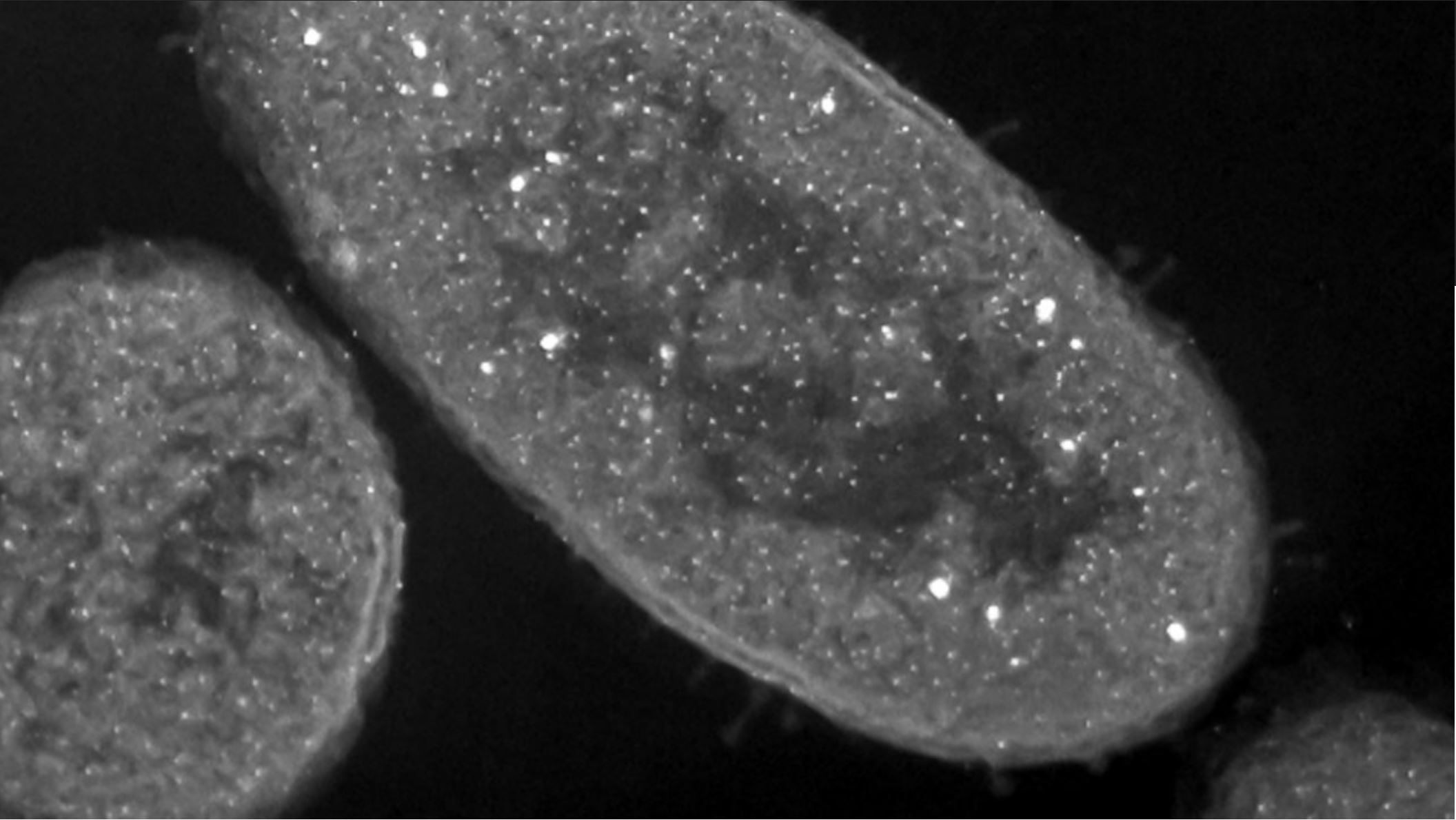 Dead bacteria store the microscopic silver particles within their cells (see above image of dead bacteria with silver nanoparticles (white spots), making them deadly to live bacteria. (Source: "Antibacterial Activity of Silver-Killed Bacteria: The "Zombie" Effect" (2015), https://pubmed.ncbi.nlm.nih.gov/25906433/).
Dead bacteria store the microscopic silver particles within their cells (see above image of dead bacteria with silver nanoparticles (white spots), making them deadly to live bacteria. (Source: "Antibacterial Activity of Silver-Killed Bacteria: The "Zombie" Effect" (2015), https://pubmed.ncbi.nlm.nih.gov/25906433/).
It's important to note that Silver Impregnated Carbon is BACTERIOSTATIC - meaning that it inhibits or prevents the increase or growth of bacterial levels WITHIN the filter only. Silver Impregnated Carbon Filters WILL NOT sanitise, disinfect or remove bacteria from water.
Disinfection For Protection Against Bacteria
For sanitation against common water-borne bacteria/viruses in rainwater and potable bore water (i.e. *bore water that has been tested to the Australian Drinking Water Guidelines and deemed suitable for drinking purposes per the Guidelines’ aesthetic, health and safety recommendations), we recommend dosing your water source with a product such as Hydrosil Ultra 7.5% Water Sanitiser. Dosing with a disinfectant will ensure residual protection against microbiological contamination/biofouling in your pipework and/or filter system.
Stage 4: Calcite/Carbon pH Neutralisation Cartridge
It's quite common and natural for tank water to be acidic, if you are running standard filtration this cartridge can be added as a final stage before the faucet to again neutralize the low pH. Therefore, neutralizing the pH of acidic water has fast become a standard requirement as the general population become more aware of the benefits of drinking alkaline water. Guaranteed to raise the pH to neutral 7 pH - but our testing has shown that we are reaching much higher pH or around 8.4 - 8-9 at least while the cartridge is new.
Replacement Filters - Every 6-12 Months or as required:
Optional Add On: Inline Magnetic Water Conditioner (Never needs replacing)
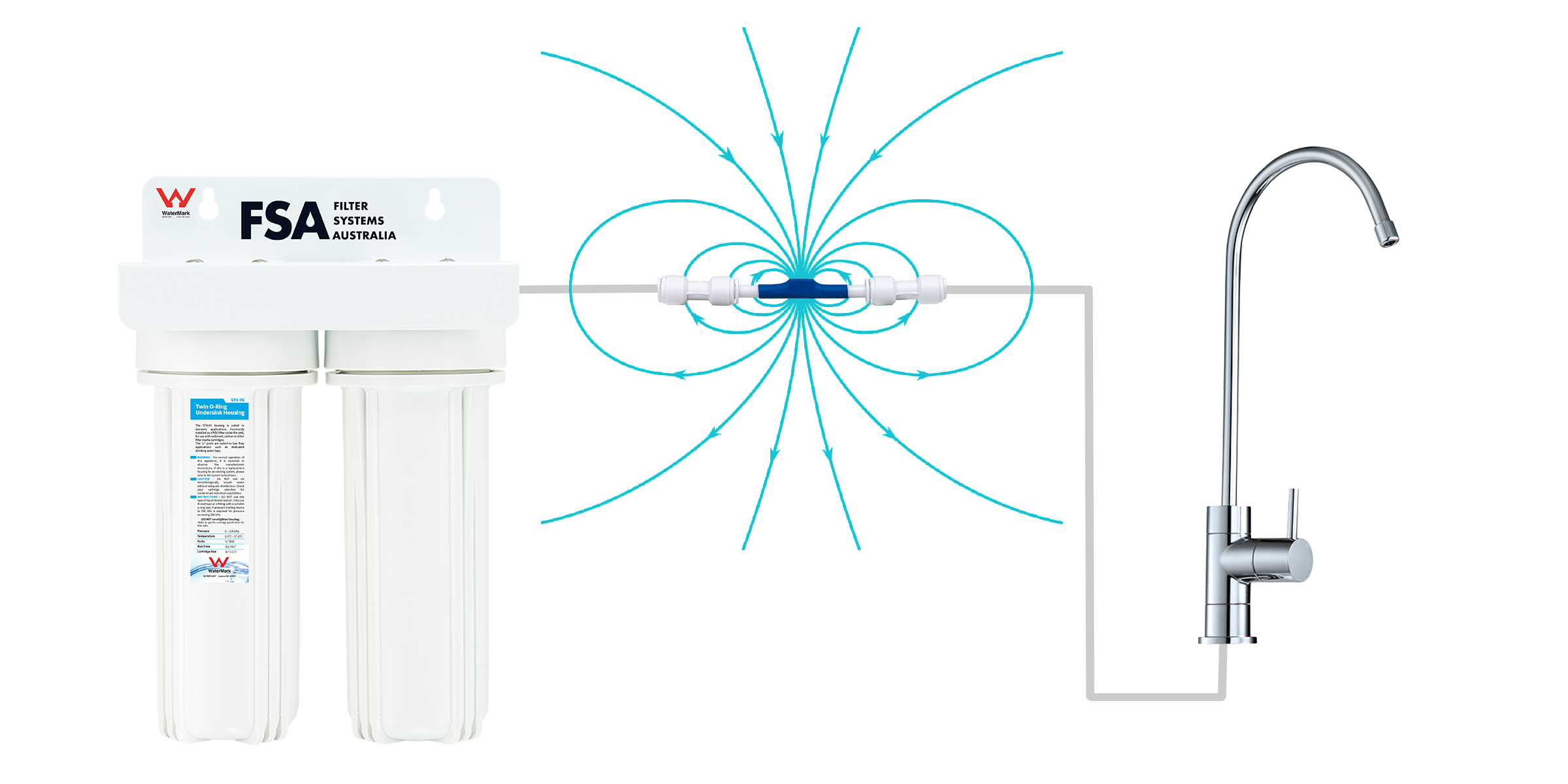
The effects of magnetization on the physicochemical properties of water have been well documented in scientific literature for several decades, with findings ranging from the application of magnets to reduce the growth of limescale in pipes, through to the documentation of magnetically treated water being used to improve the quality and quantity of fruit yield in capsicum plants and increasing the level of oxygen in water to improve hatch rate of fish eggs.
Faucet Tap Options
All of our under-sink filter systems come with a dedicated drinking water faucet tap as standard – which means you will need to drill a hole into your sink or benchtop to install it. Alternatively, you can swap out your current faucet for a 3-way mixer tap, which includes all 3 lines in the one faucet (Hot, Cold & Filtered) – this is a great option for those who don’t want to drill (i.e. if you have a stone benchtop), and it also looks nice and minimalistic. If you would like to explore our range of faucets and mixer taps in better detail, please click the below:
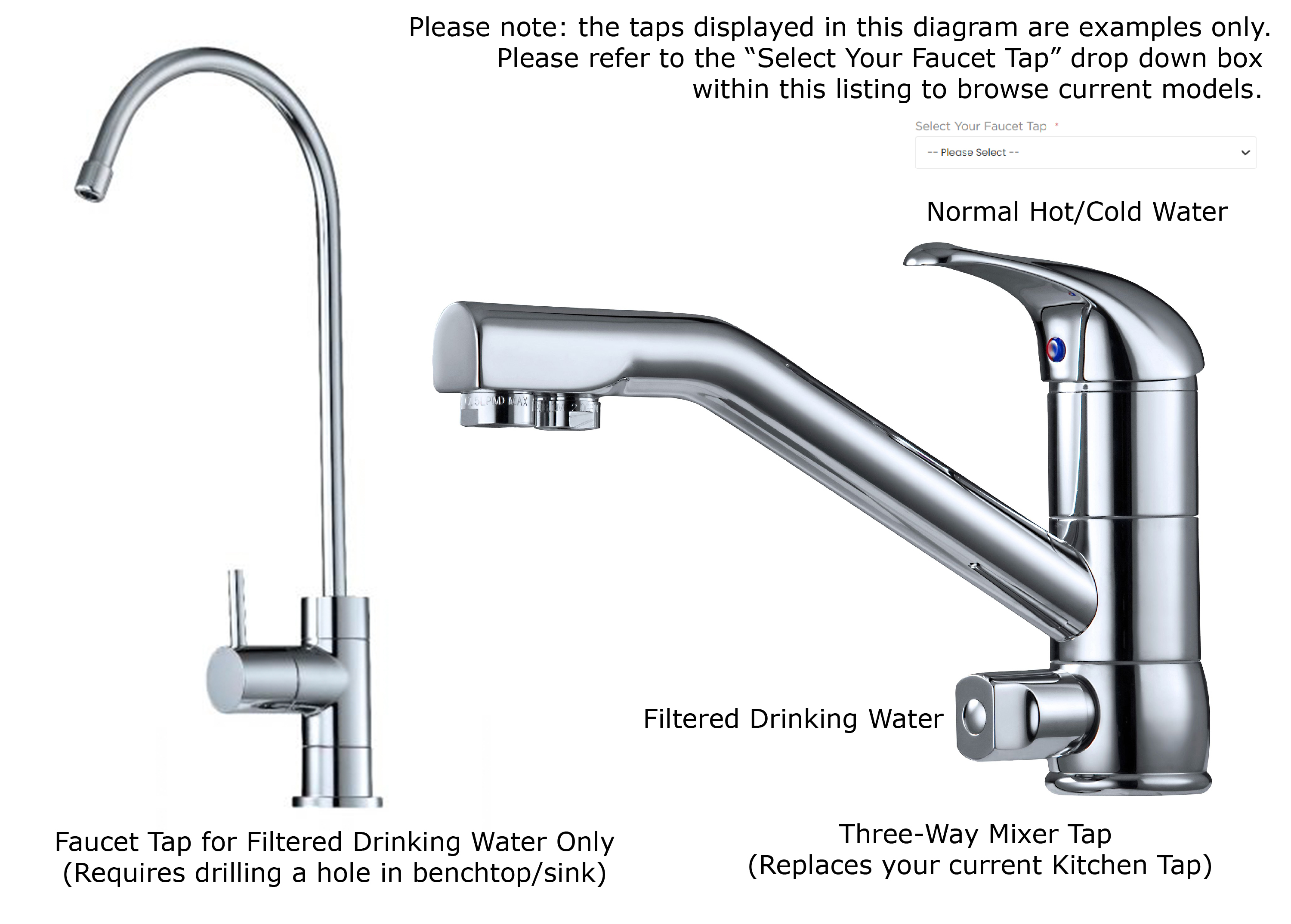
INSTALLATION - Please note this system is WaterMark Certified to Australian plumbing standards (AS/NZS 3497), and will need to be installed by a licensed plumber. Simply order online with free shipping to your home, and once it arrives any local licensed plumber will be able to do the installation (the system also comes with instructions)!
***IMPORTANT INFORMATION ABOUT WATER SANITATION***
Disclaimer: Do not use or drink microbiologically unsafe water or water of unknown quality without adequate disinfection.
FSA’s Recommendation for Rain/Tank/Potable Bore Water*
If you use Rain/Tank Water and Potable Bore Water (*i.e bore water that has been tested to the Australian Drinking Water Guidelines and deemed suitable for drinking purposes per the Guidelines’ aesthetic, health and safety recommendations), please see below our recommended filtration schedule to ensure safe drinking water:
- External Sediment + Carbon Pre-Filtration to Prevent Tank Clogging + Improve Initial Taste & Odour
- Tank Dose with HydroSil Ultra 7.5% for Protection Against Bacteria & Viruses
- Undersink <1 Micron Absolute Filter for Protection against Parasites & (Optional) Coconut Carbon for Improved Final Taste & Odour
Read on for a full explanation of why we recommend this as the minimum standard of filtration for treating Rain/Tank/Potable Bore Water for drinking.
For Protection Against Bacteria/Viruses
Bacteria (such as E.Coli) can colonize in the stagnant water and result in harmful illnesses when consumed. For sanitation against common water-borne bacteria/viruses in rainwater and potable bore water*, we, therefore, recommend dosing your tank with a product such as Hydrosil Ultra 7.5% Water Sanitiser to ensure protection against microbiological contamination/biofouling in your pipework and/or filter system.
HydroSil is a food-grade silver-activated, hydrogen-peroxide based water sanitiser, which acts to oxidise bacteria and viruses, without leaving any dangerous residues behind. HydroSil sanitizes and protects your tanks and water storage devices, making rainwater and potable bore water safe and suitable for human consumption. HydroSil is not a chlorine-based chemical like most sterilisers on the market today. It is non-toxic, and safe to use around your home and family.
Dosage Rate: HydroSil should be dosed at a rate of 200mL per 1000L of water. To scale down to tank size, you will require 20mL per 100L.
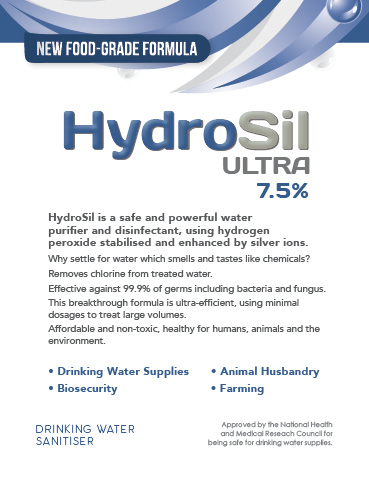
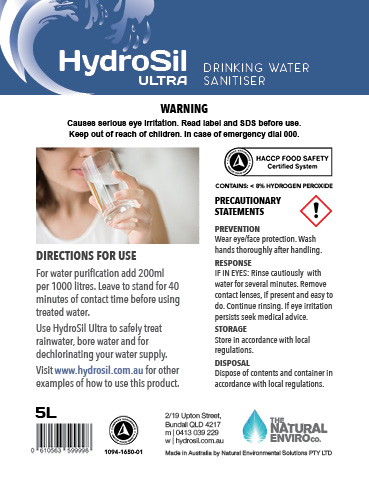
Buy Hydrosil Ultra 7.5% Here:
For Protection Against Parasites/Protozoa
Ingesting waterborne parasites (Protozoan Cysts) such as Cryptosporidium and Giardia (which flourish in raw water sources such as rain water tanks and bores), are a common cause of gastroenteritis. Whilst Chlorine can inactivate Giardia with a moderate dose and contact time, Chlorine has a negligible effect on Cryptosporidium unless dosed in excess of the acceptable Chlorine limit per the Australian Drinking Water Guidelines (Version 3.6, pp. 200).
For protection against these common cysts, we, therefore, recommend under sink filtration down to at least 1 Micron (Absolute) or smaller (i.e. with Reverse Osmosis or the Caware 0.1 Micron Absolute 3-in-1 Sediment, Chemical + Bacteria Reduction Filter). Such fine filtration, used along with regular sanitation (i.e. with HydroSil Ultra 7.5%) is a cost-effective and safe drinking water solution for rain water and potable bore water*, and is perfect for casual disinfection requirements such as when travelling in a caravan.
Why UV Disinfection is NOT Recommended for Travelling/Casual Use
You may have read that Ultraviolet (UV) Disinfection is one of the safest and most effective methods for treating drinking water, as it has a minimal effect on drinking water’s composition and taste, whilst killing 99.9% of microbiological contaminants. It's true that UV is highly effective at inactivating the DNA cells of water-borne micro-organisms such as bacteria and viruses, and is excellent at killing chlorine-resistant parasites such as Giardia and Cryptosporidium.
However, as effective as they are, please note that UV systems are generally NOT recommended for caravanning and casual use, for the following reasons:
- UV Systems require electrical input and typically need to be left on 24/7 to prevent degradation of the UV lamp (not ideal for infrequent use).
- UV radiation also heats up the UV chamber and, in some cases, requires a constant flow of fresh water and a thermal release valve to release the hot water (which is not ideal on a small water tank).
- UV Systems also contain fragile glass components (not ideal for travelling).










